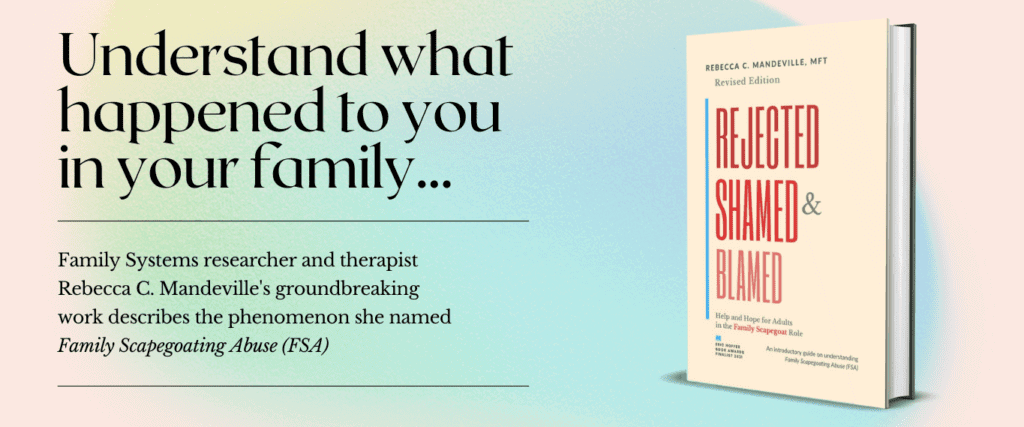About Rejected, Shamed, and Blamed: Help and Hope for Adults in the Family Scapegoat Role.
It’s been rewarding to see the interest in my work on family scapegoating abuse (FSA) growing steadily since I published my book, Rejected, Shamed, and Blamed, over two years ago. Many people appreciate the fact that not only do I research, write about, and help people recover from FSA – I’ve lived it.
There can understandably be resistance on some people’s part in regard to accepting the fact that some processes related to FSA can be unconscious; however, it has been my experience that this is a critical piece of information for adult survivors of FSA who grew up in a dysfunctional, versus narcissistic, family system, as it validates the reality of their having been harmed by this form of insidious ‘invisible’ abuse.

Purchase on Amazon (U.S.) (Amazon has the Kindle, Paperback, and Hardcover version)
Purchase at These Online Book Retailers (including Amazon) via this International Universal Buy Link (UBL)
Scroll down to read more about FSA and scapegoat recovery. And do be sure to check out my free and paid FSA adult survivor resources offerings via the menu at the top of this page.
- Why family scapegoating behaviors qualify as psycho-emotional abuse in highly dysfunctional and narcissistic families.
- Sharing my years of clinical and academic qualitative research findings on what I eventually named ‘Family Scapegoating Abuse’ (FSA) and more recently, ‘Family Scapegoating Trauma’ (FST) to educate both adult survivors and interested Mental Health professionals on this poorly understood dysfunctional family phenomenon.
- How the systemic, unconscious defense mechanism known as the Family Projective Identification Process (which is similar to a shared family ‘psychosis’) can fuel family scapegoating abuse, including in family systems that are dysfunctional but not narcissistic (and yes, there is a difference).
- Why family scapegoating abuse victims should be assessed for complex trauma (C-PTSD).
- Understanding the inter-play between family scapegoating abuse; the family projective identification process; intergenerational trauma; toxic shame; betrayal trauma; and complex trauma (C-PTSD).
As the FSA adult survivor begins to dis-identify from the damaging, distorted family scapegoat narrative, the light of their true self is reclaimed. The false self that developed as a consequence of a non-nurturing, rejecting, and emotionally threatening family environment will drop away, creating space and energy for the cultivation of a joyful and purposeful life, unburdened by self-doubt, self-blame, and toxic shame.
– Rebecca C. Mandeville, author of ‘Rejected, Shamed, and Blamed’
What People Are Saying About Rejected, Shamed, and Blamed
“As a clinical social worker, I enthusiastically recommend this book!” – Amazon reviewer
“Very good book on an oft-misunderstood family dynamic.” – Amazon reviewer
“Life-changing read!” – Amazon Customer
“If you think or know you’ve suffered/are suffering from Family Scapegoat Abuse, run – don’t walk – to the add to cart button. This book is clear & concise & informative & ACCURATE…I felt like the author completely described my life. After reading this, I feel understood…and empowered to heal and finally kick this scapegoat role to the curb. I wish anyone else who has dealt with this a life free from such a painful, pervasive issue. I am certain you’ll find this book extremely helpful.”
Much gratitude to the author :) – Amazon Customer
“Your book offers healing that I thought would never be possible! “- YouTube Subscriber
“My psychologist gave me your book to read. I finally could understand what happened to me in my family and now know what to do to recover from it. Your book literally saved my life!” – YouTube Subscriber
“Finally, a book written by a licensed clinician who has worked as a Family Therapist. Your insights on dysfunctional families that scapegoat are invaluable! ” – YouTube Subscriber
This is an excellent book for patients or practitioners. The author shares her extensive experience working with and studying toxic families and how to recover from the experience. This book is a must have for anyone treating those from dysfunctional families or family members themselves.– Melissa Petty, LMSW